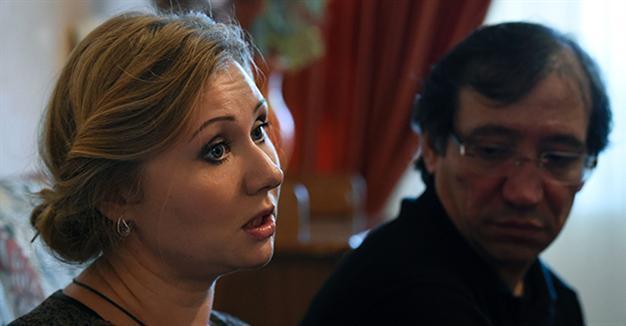No holiday cheer as Turks in Russia dread 2016
MOSCOW - Agence France-Presse

A picture taken on December 11, 2015 shows Turkish businessman Bülent Yalın (R) as he looks at his Russian wife Yelena Korzhavina (L) at their home in the town of Novo-Peredelkino outside Moscow. AFP Photo
Mehmet Ali Düzcü usually holds a holiday party for his small team of colleagues in Moscow, but this year he is in no mood to celebrate.
His firm, which imports textiles from Turkey, had already been hurting from Russia's economic crisis, but now sanctions Moscow has imposed against Turkey over the downing of a Russian jet on Nov. 24 -- which go into effect on January 1st -- have "practically been a death sentence", he said.
Düzcü, who hails from Turkey but acquired Russian citizenship during his two decades in the country, is one of thousands of Turks who are now living in fear of an uncertain future in Russia, even after spending decades in the country they consider home.
"When my colleagues ask me what will happen to us next year, I have nothing to say to them, and I don't want to lie," said Düzcü, 46, whose company imports bedding, bathrobes and other household goods for large Russian chains and online stores.
"I have absolutely zero holiday spirit," he said.
Since Ankara shot down a Russian warplane on the Syria-Turkish border, Moscow regards Turkey -- a trading partner and top tourist destination for Russians -- as an adversary.
The Russian government has come up with a wide range of measures to go into effect come 2016, including an embargo on produce and limits on employment of Turkish nationals.
Since the incident, many Turks have been deported and Turkish companies raided by police, forcing some to suspend operations.
Textiles have not been specifically targeted by sanctions but Industry and Trade Minister Denis Manturov said on Dec. 29 a ban on imports of consumer goods from Turkey was still an option. An embargo on Turkey's light industry had been drafted just in case, he added.
"It will be hard to substitute Turkish textiles, but nobody can guarantee that they won't try," said Düzcü, whose business is already suffering due to delays in customs processing, which now takes three times longer than before the incident.
But what scares Turks like Düzcü the most is the political grandstanding by both Istanbul and Moscow following the incident, and a media atmosphere in which anti-Turkish sentiments are thriving.
"I consider both countries mine and it's very hurtful to hear the anti-Turkish propaganda on Russian television," said Bülent Yalın, another Turkish businessman who said he avoided going outside for the first few days after the downing of the jet and the ensuing storm of angry rhetoric.
"I just had the feeling that all is lost," said Yalın, who has three children with his Russian wife but only residency status in the country.
Yalın estimates that some 200,000 mixed families could be hurt by the measures, while his wife Yelena Korzhavina sent a letter to Russian President Vladimir Putin saying sanctions hurt primarily ordinary people like themselves.
"All plans are crumbling before our eyes," Yalın said sitting in his flat in the outskirts of Moscow as his twin toddler daughters romped on the floor with a pile of Legos.
Russia's state media quickly caught on the message after President Putin accused Turkey of a "stab in the back" and accused his Turkish counterpart Recep Tayyip Erdoğan of trading oil with the Islamic State of Iraq and the Levant (ISIL) jihadists.
Since November, Turkey has become the number one enemy in Russian media, overtaking the United States, Ukraine and even ISIL itself in terms of the number of negative mentions, RBK news agency reported on Dec. 29, quoting data from media monitor Medialogia.
In a poll conducted this month by the Public Opinion Foundation pollster, 29 percent of Russians viewed Turks more negatively than before the November 24 incident, with only 24 percent saying they like Turkish people.
"Not many people give a lot of thought to what the media says, most will truly tie Turkey and Turkish citizens directly to terrorism," said Korzhavina, Yalın's wife.
"I really don't want this hatred to continue," she said, fearing that anti-Turkish propaganda falls on an audience already disgruntled with the economic crisis that may be more than willing to find a scapegoat.
Düzcü, the textile importer, said he forbade his children from loudly speaking Turkish in public and now thinks twice before mentioning his heritage to strangers.
"I'm not happy with the Turkish government, I never voted for Erdoğan, and shooting down that plane was a deadly mistake," he said. "But Russia should not react so harshly, it should not provoke people with nationalist attitudes."
"God forbid, this will lead to a peaceful Turk or Russian being attacked and then it will be hard to forgive one another," he added.
"Before it's too late, both governments should back down."
